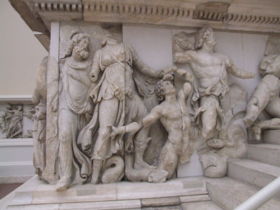- Nereus
-
In Greek mythology, Nereus (Νηρεύς) was the eldest son of Pontus (the Sea) and Gaia (the Earth), a Titan who with Doris fathered the Nereids, with whom Nereus lived in the Aegean Sea.[1] In the Iliad[2] the Old Man of the Sea is the father of Nereids, though Nereus is not directly named. He was never more manifestly the Old Man of the Sea than when he was described, like Proteus, as a shapeshifter with the power of prophecy, who would aid heroes such as Heracles[3] who managed to catch him even as he changed shapes. Nereus and Proteus (the "first") seem to be two manifestations of the god of the sea who was supplanted by Poseidon when Zeus overthrew Cronus.
The earliest poet to link Nereus with the labours of Heracles was Pherekydes, according to a scholion on Apollonius of Rhodes.[4]
During the course of the 5th century BC, Nereus was gradually replaced by Triton, who does not appear in Homer, in the imagery of the struggle between Heracles and the sea-god who had to be restrained in order to deliver his information that was employed by the vase-painters, independent of any literary testimony.[5]
In a late appearance, according to a fragmentary papyrus, Alexander the Great paused at the Syrian seashore before the climacteric battle of Issus (333 BC), and resorted to prayers, "calling on Thetis, Nereus and the Nereids, nymphs of the sea, and invoking Poseidon the sea-god, for whom he ordered a four-horse chariot to be cast into the waves."[6]
Nereus was known for his truthfulness and virtue:
But Pontos, the great sea, was father of truthful Nereus who tells no lies, eldest of his sons. They call him the Old Gentleman because he is trustworthy, and gentle, and never forgetful of what is right, but the thoughts of his mind are mild and righteous.[7]
Greek deities
seriesPrimordial deities Titans and Olympians Chthonic deities Personified concepts Other deities Aquatic deities The Attic vase-painters showed the draped torso of Nereus issuing from a long coiling scaly fishlike tail.[8] Bearded Nereus generally wields a staff of authority. He was also shown in scenes depicting the flight of the Nereides as Peleus wrestled their sister Thetis.
In Aelian's natural history, written in the early third century CE,[9] Nereus was also the father of a watery consort of Aphrodite named Nerites who was transformed into "a shellfish with a spiral shell, small in size but of surpassing beauty."
Nereus was father to Thetis, one of the Nereids, who in turn was mother to the great Greek hero Achilles, and Amphitrite, who married Poseidon.
Contents
Modern usage
The largest Mediterranean underwater sea cave yet found, lying northwest of Sardinia, was named by the discoverers, the Nereo Cave, in honor of this mythological figure.
Also, the deepest-diving underwater ROV, which recently set a record for exploring the Challenger Deep of the Mariana Trench, is named after this figure.[10]
In The Secrets of the Immortal Nicholas Flamel, Nereus appears as an Elder in Book 3 of the series, The Sorceress. In it he confronts and battles Perenelle Flamel in an effort to capture and subdue her, thereby making her his wife. He is described as being a man holding a trident from above the waist and below being an octopus. Perenelle ends up defeating him and his daughters, the Nereids, who appear as sharp toothed monsters.
In the T.V. series Stargate SG-1, a minor Goa'uld was named "Nerus". He was a scientist and inventor of technologies. He was the one who while working for Ba'al (Leader of the Goa'uld), made the stargates all dial up simultaneously during the battle with the Replicators. Nereus later tricked General Landry into aiding the Ori by claiming that they should throw all their firepower at an Ori beachhead in the Milky Way.
Notes
- ^ Hesiod, Theogony 233-36, is unequivocal that Nereus is the Old Man of the Sea (ἅλιος γέρων), whereas the Odyssey refers the sobriquet to Nereus (xxiv.58) to Proteus (iv.365, 387), and to Phorkys (xiii.96, 345).
- ^ Iliad i.358, 538, 556; xviii.141; xx.107; xxiv.562.
- ^ Or, as Proteus, Menelaus.
- ^ On Argonautica iv.1396f, noted by Ruth Glynn, "Herakles, Nereus and Triton: A Study of Iconography in Sixth Century Athens" American Journal of Archaeology 85.2 (April 1981, pp. 121-132) p 121f.
- ^ Glynn 1981:121-132.
- ^ Papyrus Oxyrrhincus FGH 148, 44, col. 2; quoted by Robin Lane Fox, Alexander the Great (1973) 1986:168 and note. Thetis was the mother of Alexander's hero Achilles.
- ^ Hesiod, Theogony 233
- ^ Theoi.com; Glynn 1981.
- ^ Aelian, On Animals 14.28
- ^ "The Abyss: Deepest Part of the Oceans No Longer Hidden"
References
- Kerenyi, Karl (1951). The Gods of the Greeks.
- Graves, Robert. The Greek Myths.
External links
- - Theoi Project, Nereus - the sea-god in classical literature and art
Categories:- Greek mythology
- Greek gods
- Sea and river gods
- Shapeshifting
- Offspring of Gaia
- Greek sea gods
Wikimedia Foundation. 2010.

